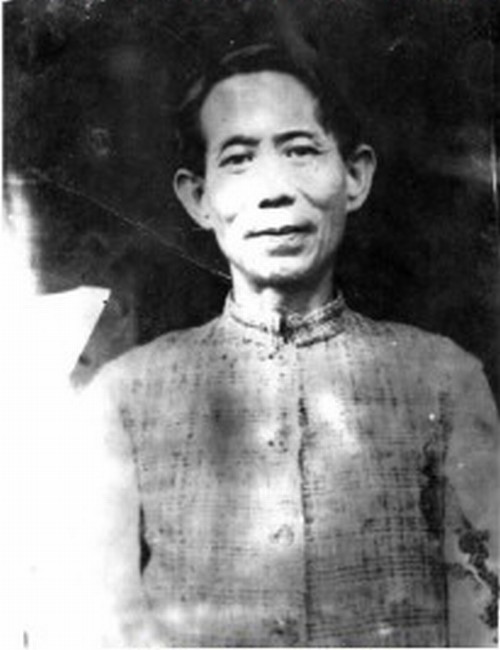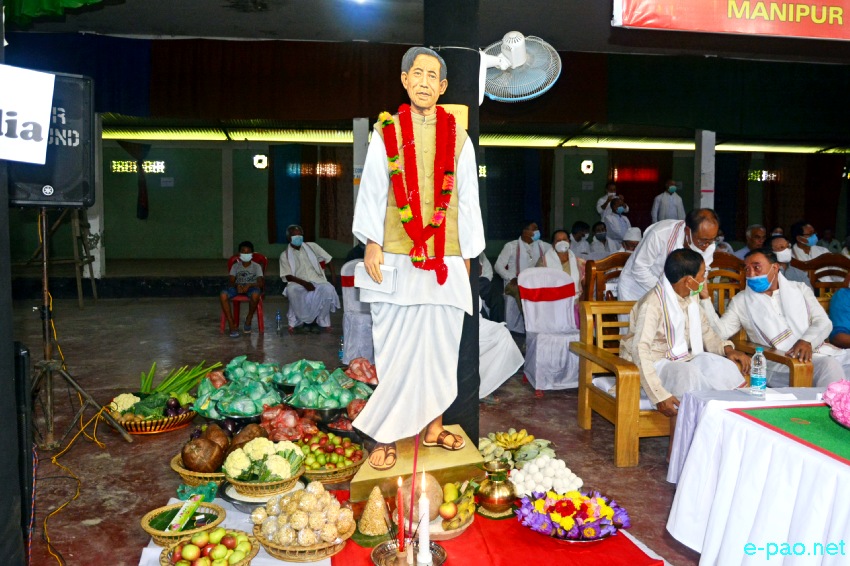Resilience and Reform Hijam Irabot's struggle against socio-religious oppression in Manipur
Yenning *

Picture Courtesy : Irabot Day Observation Committee Delhi
Hijam Irabot, affectionately and aptly known as Lamyanba Irabot (literally, the Pioneer Irabot), stands as the unparalleled leader of the masses in the entire annals of Manipurís history. No other figure can measure up to the towering stature of this pioneer. This is perhaps why the whole month of September, commemorating Irabotís birth and passing, is observed annually with widespread and enthusiastic participation.
As much as Irabotís name holds a special place in the hearts of ordinary citizens, his persona remains a subject of enduring fascination for a diverse array of individuals, including social scientists, historians, revolutionaries, poets, and journalists alike.
Irabot met his martyrdom in the relentless struggle against the twin plagues of foreign subjugation and domestic tyranny. Amidst the constellation of leaders, self-proclaimed and genuine, hailing from Manipurís soil, Irabot stands alone as the singular advocate who championed the cause of the toiling, oppressed masses. He wore many hats-a poet, a dramatist, a journalist, and, at his core, a devoted revolutionary. In the contemporary political landscape of Manipur, Irabot is enshrined as a legend.
Even the seat of influence and the privileged life afforded to Irabot as a Member of the Manipur State Durbar could not dampen his revolutionary zeal. Unlike his peers of the elite class, he couldnít simply ignore the suffering of the masses from the ivory tower of Durbar membership. Before long, Irabot relinquished his status and position of power, even at the cost of estranging the royal family with whom he had matrimonial ties, to champion the cause of the oppressed masses.
Irabotís movement was remarkably multi-faceted, as he spearheaded the call for a sovereign republic to replace a British-controlled monarchy while also leading the charge against the exploitation of people in the guise of religion, particularly Hinduism. Appropriately dubbed Lamyanba Irabot, he blazed trails in a multitude of domains. He was a trailblazer in journalism, catalysed studentsí movements, excelled in sports, orchestrated the political mobilisation of the masses, and played a pivotal role in the armed revolutionary movement.
With a heartfelt acknowledgement of the widespread recognition bestowed upon Irabot for his pivotal role in the socio-political transformation of Manipur, as evidenced by the annual celebration of September as Irabot Month, Yenning aims to delve into the zenith of British imperialism in Manipur, right up to the formal transfer of paramountcy to the Indian Union, with a particular focus on Irabot and his endeavours.
The era of Maharaja Churachand was marred by an unprecedented wave of religious oppression orchestrated by the Brahmasabha, alongside political subjugation under British colonial rule. What truly distinguished Hijam Irabot as the unrivalled leader of the masses was his simultaneous and intertwined struggle against religious oppression and political domination.
During that period, the socio-religious fabric of the populace was under the complete dominion of the Brahmasabha, which enjoyed full support from the monarchy. Excommunication and social ostracism were commonplace occurrences. It was customary for Bamons (Manipuri Brahmin) to marry Meitei women and relegate their wives to outcasts within their own families.
Furthermore, they were forbidden from breastfeeding and tending to their children. Even if Meitei women, unable to endure such atrocities, sought separation from their Bamon husbands, they were denied the right to remarry. The practice of Chandal Senkhai stands out as one of the most audacious schemes devised by the Brahmasabha to secure a steady income from the populace.
During Churachandís reign, every individual in the Manipur valley who embraced Hinduism was compelled to wear the Chandal mark on their forehead. Additionally, the Brahmasabha exacted a fixed sum for this adornment.

125th Birth Anniversary of Jananeta Irawat at Iboyaima Shumang Leela Shanglen on 30 September 2021 :: Pix - Shanker Khangembam
In addition to these impositions, the State administration under British colonial rule imposed numerous taxes and duties upon the common masses. Amin Chakthak, Peon Chakthak, Dolaireng, Yarek Santri, and providing sustenance for horses and elephants without compensation were among the prevalent forms of exploitation witnessed during the zenith of British imperialism in Manipur.
Villagers were coerced into fulfilling Aminís and village chowkidarsí needs, including food and lodging, whenever they visited any village. This practice encapsulates the essence of Amin Chakthak. Similarly, officials from the Agriculture Department arriving in villages for tax collection were provided food and other necessities by the villagers, a practice known as Peon Chakthak.
Government functionaries, such as peons and clerks, traversing between villages were borne on palanquins or litters by the villagers without any remuneration, obligatory labour termed Dolaireng. Moreover, villagers were compelled to stand guard over Government officials and the tax revenues they had collected day and night, yet received no compensation for this service. This exploitative practice, known as Yarek Santri, exemplified yet another form of oppression endured by the common masses.
The Brahmasabha maintained a stranglehold over every family in the Manipur valley, leaving no room for personal agency, even in matters of death. The Brahmasabha could declare any family impure (Mangba) following a death, prohibiting the grieving family from conducting the cremation rites for their departed loved one.
Only after paying a Ďpurification fineí to the Brahmasabha, which was often set at an exorbitant sum, around Rs 80, a considerable amount during those times, were they permitted to proceed with the cremation. Predictably, this practice swiftly evolved into a potent instrument of both religious oppression and economic exploitation, benefiting the members of the Brahmasabha and the king.
In addition to the already burdensome taxes imposed by British colonial rule, the impoverished masses were subjected to various additional levies by the Brahmasabha, all in the name of imported Hindu doctrines. Notable examples include Chandal Senkhai, Panch-napet, Pala Sentek, Kang- ching Thouri Sentek, etc.
The era was marred by the pervasive practice of forced labour, characterised by three distinct forms: Potthang Puba, Potthang Shuba, and Potthang Selkhai. In Potthang Puba, high-ranking Government officials coerced ordinary villagers to be their porters during their tours.
The construction of roads, bridges, and bungalows compelled many people to assemble and toil as labourers, a practice referred to as Potthang Shuba. Regrettably, the Government never compensated those serving as porters and labourers.
Additionally, under the pretext of Potthang Selkhai, bureaucrats compelled the villagers to provide fish, chicken, eggs, other domestic animals, rice, and even cash as offerings. This exploitation persisted unabated during the tenure of Political Agent Mr Shakespeare.
This period stands as one of the bleakest chapters in Manipurís history. From this darkness emerged a beacon of hope in the form of the Nikhil Hindu Manipuri Mahasabha (later rebranded as Nikhil Manipuri Mahasabha) under the capable leadership of Hijam Irabot.
Well before embracing Marxism as his political ideology, Irabot was at the forefront of the struggle against political subjugation, economic exploitation, and religious oppression of the masses by both British imperialists and the Brahmasabha, endorsed by the king. Confronted with the Brahmasabhaís egregious edicts that subjected individuals to excommunication, only to be re-admitted upon payment, Irabot emerged as a messianic figure for the oppressed masses.
Through his Goura Dharma Pracharini, Irabot and his followers openly defied the king and the Brahmasabha, conducting cremations and performing shrada ceremonies, both of which were prohibited. Irabot was reasonably successful in abolishing or mitigating many of the socio- religious injustices endured by the people at that time if not all. Up to this juncture, Irabot can be viewed as a progressive reformer.
The Chinga Session of the Nikhil Hindu Manipuri Mahasabha on December 29, 1938, marked a pivotal moment in Irabotís political journey and indeed in Manipurís political landscape. The Mahasabha evolved into a purely political platform encompassing all of Manipurís people, both from the hills and the valley, with the exclusion of the term ďHinduĒ from its name.
In a highly symbolic gesture, Irabot inaugurated the Chinga Session by hoisting a flag bearing the emblem of Pakhangba Paphal, strikingly similar to the Manipuri National flag used just before the British conquest of Manipur.
The session adopted five resolutions, the most significant of which included the demand for Manipurís sovereignty, elections through the adult franchise, the release of Gaidinliu, and the abolition of practices such as Yarek Santri, Peon Chakthak, Amin Chakthak, Potthang, Doilareng, and so forth.
British authorities were perturbed by Irabotís rapidly evolving mass movement, swiftly acquiring a political character, deviating from his earlier social reformation endeavours. His arrest on January 9, 1940, evidenced this apprehension and subsequent imprisonment for three years. In contrast, Bal Gangadhar Tilak apprehended earlier on similar charges related to his anti-British imperialist stance, was incarcerated for a mere four months.
In the post-British era, newly independent India, in collaboration with specific local Congress figures, exploited the ďIrabot factorĒ by disseminating a false narrative suggesting that Irabot was working towards integrating Manipur with Burma, all to expedite the annexation of independent Manipur into the Indian Dominion.
However, this narrative remained a pretext and failed to sway the populace, as demonstrated by the contentious circumstances surrounding Maharaja Bodhchandraís coerced signing of the Merger Agreement. Indeed, as a communist, Irabot had associations with Burmese communists, driven by a vision to liberate the oppressed people of the entire Indo-Burma region from colonial subjugation through the coordination of communist revolutionaries.
While he staunchly opposed the formation of Purvanchal by merging Tripura, Cachar, Manipur, and Lushai Hills (Mizoram), Irabot remained resolute that the political destiny of Manipur should not be left to the whims of either India or Burma.
Hijam Irabotís legacy carries significant contemporary relevance in several ways. His tireless efforts against socio-religious oppression and economic exploitation highlight the ongoing struggle for social justice and equity.
His commitment to uplifting the marginalised and oppressed serves as an inspiration for modern-day activists and reformers. His vision for a united Manipur, inclusive of both hills and valley communities, resonates in todayís context where fostering unity and understanding among diverse populations remains a crucial goal.
Moreover, Irabotís defiance against oppressive regimes and institutions is a timeless reminder of the importance of standing up against authoritarianism and advocating for democratic principles and human rights.
His efforts to preserve and promote Manipuriís cultural identity in the face of external influences serve as a poignant reminder of the ongoing importance of preserving and celebrating local cultures and traditions.
Irabotís stance on the political destiny of Manipur, not being dictated solely by neighbouring countries, remains pertinent in discussions of regional geopolitics and self-determination. His ability to mobilise the masses for social and political change is a model for contemporary grassroots movements working towards similar goals.
Irabotís dedication to education and awareness-raising is particularly relevant today in promoting literacy, critical thinking, and awareness about socio-political issues. His multi-faceted approach to fighting against various forms of oppression demonstrates the interconnectedness of different struggles for justice, a concept that remains relevant in modern activism.
His critique of exploitation by colonial powers and local elites is a timely reminder of the ongoing need to scrutinise power structures and economic inequalities. Finally, Irabotís association with Burmese Communists in pursuit of a larger vision for regional liberation resonates with contemporary calls for international solidarity in addressing global issues.
Hijam Irabotís legacy remains a beacon for those advocating for justice, inclusivity, and empowering marginalised communities in Manipur and beyond. His principles and actions offer valuable lessons and inspiration for worldwide contemporary social and political movements.
* Yenning wrote this article for The Sangai Express
The writer can be contacted at hoiyenning(AT)proton(DOT)me
This article was webcasted on 07 October 2023.
* Comments posted by users in this discussion thread and other parts of this site are opinions of the individuals posting them (whose user ID is displayed alongside) and not the views of e-pao.net. We strongly recommend that users exercise responsibility, sensitivity and caution over language while writing your opinions which will be seen and read by other users. Please read a complete Guideline on using comments on this website.








